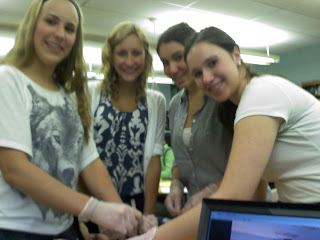Yes, this is another top ten list. What’s worse, it’s a list
of my favorite videos that I have made. Sorry! :)
For the past two years, I have been posting a weekly video podcast
with fellow coaches Jason, Wendy and Glenn. We’ve put a lot of time, effort and
creative energy into these weekly video episodes, and I know that educators
will find many of these useful, if not just amusing. Here is the best we’ve had to offer over the past two years:
10) Comic Strips with ToonDoo ~ October 28, 2011
This week's tip showed how to get started with ToonDoo, where your students can create their own comic strips in a few easy steps. It was our Halloween episode, so there were audio clips and sound effects aplenty.
This week's tip showed how to get started with ToonDoo, where your students can create their own comic strips in a few easy steps. It was our Halloween episode, so there were audio clips and sound effects aplenty.
9) Worlde ~ October 14, 2011
The topic was using Wordle to create word clouds that visually illustrate the key points and most frequently repeated words in any writing. We also used some quick and easy stop-motion video to demonstrate digital storytelling this week. We received many more requests for help making stop-motion video than we did for Wordle after this episode… and that’s OK!
The topic was using Wordle to create word clouds that visually illustrate the key points and most frequently repeated words in any writing. We also used some quick and easy stop-motion video to demonstrate digital storytelling this week. We received many more requests for help making stop-motion video than we did for Wordle after this episode… and that’s OK!
8) Reducing Electronic Clutter ~ October 26, 2010
This quick podcast about the Inbox Zero movement, which encourages us to simplify and focus by reducing our electronic clutter, was one of the ones I sent out to colleagues more frequently than any other, mostly because the message can really help improve your focus at work. I sent this in response to help requests and showed it at professional development sessions. The principal behind it came from Jason, and it was certainly a fun one to make!
This quick podcast about the Inbox Zero movement, which encourages us to simplify and focus by reducing our electronic clutter, was one of the ones I sent out to colleagues more frequently than any other, mostly because the message can really help improve your focus at work. I sent this in response to help requests and showed it at professional development sessions. The principal behind it came from Jason, and it was certainly a fun one to make!
7) Social Bookmarking ~ September 22, 2010
Links all over the place? Can't find the one you need? Can't find your "favorites" when you switch computers or your classroom computer was reimaged? Maybe it's time you start social bookmarking! This podcast covers the basics of getting started with an account on Delicious. This was one of my favorites because it really shows Jason’s personality and humor, and we got to talk fast like “the Micro Machines Guy” at the end.
Links all over the place? Can't find the one you need? Can't find your "favorites" when you switch computers or your classroom computer was reimaged? Maybe it's time you start social bookmarking! This podcast covers the basics of getting started with an account on Delicious. This was one of my favorites because it really shows Jason’s personality and humor, and we got to talk fast like “the Micro Machines Guy” at the end.
6) Behind the Tech Tips ~ November 11th, 2011
In our Tech Tip each week, we mention that everything you see can be done using district equipment. Many of our colleagues have asked us what specific equipment and programs we use to make our videos, and how to use them so this week, we take you "Behind the Tech Tips" to show how your students can make videos in the classroom using the equipment available in you building. Instead of listening to us this week, we figured it might be more fun to ask your students to show you how to make movies. This one was fun because we took a look back at some of the videos we had made to this point, and with the help of some 5th graders at Montgomery, showed everyone how we made them.
In our Tech Tip each week, we mention that everything you see can be done using district equipment. Many of our colleagues have asked us what specific equipment and programs we use to make our videos, and how to use them so this week, we take you "Behind the Tech Tips" to show how your students can make videos in the classroom using the equipment available in you building. Instead of listening to us this week, we figured it might be more fun to ask your students to show you how to make movies. This one was fun because we took a look back at some of the videos we had made to this point, and with the help of some 5th graders at Montgomery, showed everyone how we made them.
5) Prezi ~ November 18th, 2011
This week's special Thanksgiving Tech Tip introduces Prezi, a site to create dynamic, web-based presentations. We went on location to one of our elementary schools and enlisted the help of some 6th grade students, and had a lot of fun with the turkey theme while showing teachers how to get started with Prezi.
This week's special Thanksgiving Tech Tip introduces Prezi, a site to create dynamic, web-based presentations. We went on location to one of our elementary schools and enlisted the help of some 6th grade students, and had a lot of fun with the turkey theme while showing teachers how to get started with Prezi.
4) Podcasting ~ October 8, 2010
A podcast on podcasting, using just the equipment and programs we have at our disposal on North Penn computers. This was one of our first episodes, and it was used as part of a district PD day to show a few different ways teachers and students could podcast using PowerPoint, Sound Recorder, Movie Maker, and various free websites.
A podcast on podcasting, using just the equipment and programs we have at our disposal on North Penn computers. This was one of our first episodes, and it was used as part of a district PD day to show a few different ways teachers and students could podcast using PowerPoint, Sound Recorder, Movie Maker, and various free websites.
3) Inbox Management in Outlook ~ September 23, 2011
This week's tech tip looks at ways to keep your inbox under control, including creating folders and moving messages directly into events on your calendar for later action. This was a follow-up to last year’s “Inbox Zero” podcast, with some new ideas and strategies for using Outlook more efficiently.
This week's tech tip looks at ways to keep your inbox under control, including creating folders and moving messages directly into events on your calendar for later action. This was a follow-up to last year’s “Inbox Zero” podcast, with some new ideas and strategies for using Outlook more efficiently.
2) Welcome Back! ~ September 1, 2010
Hello & welcome to a new school year! This episode explains how to contact an Academic Integration Coach, as well as how to put a link to our site on your main Intranet homepage. This was our first podcast; the one that started it all.
Hello & welcome to a new school year! This episode explains how to contact an Academic Integration Coach, as well as how to put a link to our site on your main Intranet homepage. This was our first podcast; the one that started it all.
1) Thanks for Your Feedback ~ May 10, 2011
This one is my favorite because it features the words of our colleagues, whom we asked to take a few minutes to share their experiences in working with us during our first year as Academic Integration Coaches. We received nearly 100 responses within the first few hours! We wanted to thank our colleagues for their kind words, so we shared their feedback with this week's podcast.
This one is my favorite because it features the words of our colleagues, whom we asked to take a few minutes to share their experiences in working with us during our first year as Academic Integration Coaches. We received nearly 100 responses within the first few hours! We wanted to thank our colleagues for their kind words, so we shared their feedback with this week's podcast.
Here’s a bonus…
Outlook Desktop Notification ~ October 7, 2011
This week's tip showed how to turn off / turn on / change the new e-mail desktop notification from Outlook 2007... and it was our first time experimenting with the green screen. We had a lot of fun with this one.
And one more...
Skype ~ September 29, 2010
This week's Tech Tips podcast focuses on classroom uses for Skype, a free application that allows users to make voice calls and video conferences over the Internet. This was by no means high quality or well-made, but Wendy was cracking up the whole time and we were having fun as we showed how to use Skype in one of our earliest Tech Tip of the Week podcasts.
This week will be our 53rd Tech Tip. Some have been great, some have been pretty rough. All of them were fun to make, and I know I learned a lot in researching and preparing the topics we covered. You can see all of them here by topic or by date.
Thanks for reading… and watching.
See you next Tuesday!







